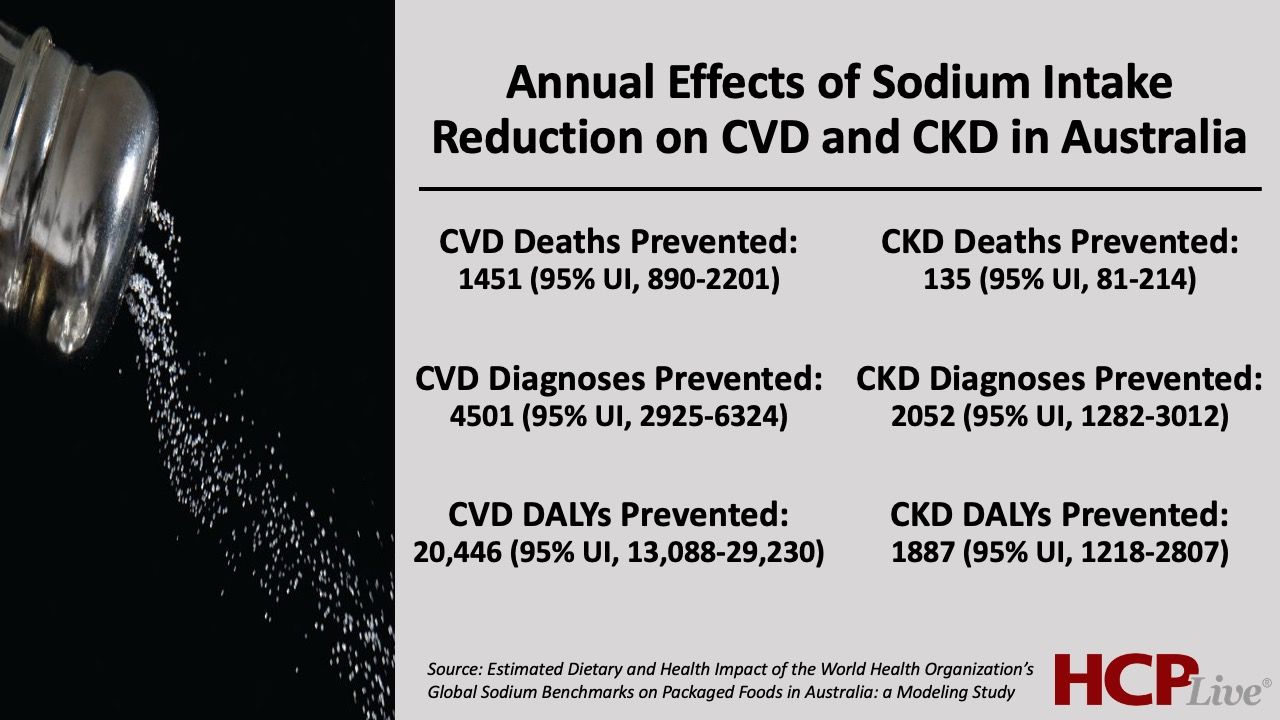Reduced Sodium Intake Could Prevent 3% of Annual Deaths from Cardiovascular and Chronic Kidney Disease
Applying a statistical model to estimate the effects of reducing sodium intake at a population level in Australia, investigators suggest adherence to World Health Organization benchmarks could prevent 6900 deaths from CVD, CKD, and stomach cancers annually.
Kathy Trieu, PhD, MPH

An analysis from the George Institute of Global Health suggests reducing sodium intake to levels recommended by the World Health Organization (WHO) could prevent up to 3% of all cardiovascular disease, chronic kidney disease, and stomach cancer deaths in Australia.
Results of the study, which estimated the effect of reducing the average sodium intake for adults by 404 mg per day, indicate reducing sodium intake could prevent more than 6500 annual diagnoses of cardiovascular disease, kidney disease, and stomach cancer nationwide and reduce the number of disability-adjusted life years (DALY) for the 3 conditions by more than 25,000 years annually.
“We had previously modeled the potential impact of the Australian program,” said lead investigator Kathy Trieu, PhD, MPH, senior research fellow in food policy at The George Institute for Global Health and a senior lecturer at the University of New South Wales, in a statement. “In this study, we wanted to estimate the potential number of additional premature deaths, new cases of disease and years lived with disability that may be averted with the WHO sodium benchmarks, which are above and beyond the Australian government’s sodium reformulation targets.”
Funded by the Australian National Health and Medical Research Council Partnership Project, the current study was conducted by Trieu and a group of collaborators with the intent of building on their previous research. In the previous study, investigators used a statistical model to estimate the effects of a nationwide plan to reduce sodium intake among 27 packaged food categories.

After their previous endeavor concluded the program could prevent 500 deaths and 1900 new cases of cardiovascular disease, chronic kidney disease, and stomach cancer annually, investigators designed the current study to estimate the impact of extending the plan to include all 58 packaged food categories included in WHO benchmarks using the same statistical model.
By implementing the WHO sodium targets, investigators determined the mean sodium intake among adults would decrease by 404 mg per day, which corresponded to a 12% reduction in intake. As a result of this change, investigators determined this might prevent 1770 (95% UI, 1168-2587) deaths per year, which corresponded to 3% of all cardiovascular disease, chronic kidney disease, and stomach cancer deaths in the country.
Further analysis indicated this reduction intake could prevent 6900 (95% UI, 4603-9513) new cases of cardiovascular disease, chronic kidney disease, and stomach cancer as well as 25,700 (95% UI, 17,655-35,796) DALYs per year from these diseases. Investigators pointed out, relative to the Australian targets, application of WHO benchmarks could prevent 3 times as many deaths each year.
“Our findings indicate that compliance with WHO benchmarks compared with Australia’s current sodium targets may result in substantial health gains and prevent more than three times as many deaths and new cases of disease each year,” Trieu added in the aforementioned statement.
This study, “Estimated Dietary and Health Impact of the World Health Organization’s Global Sodium Benchmarks on Packaged Foods in Australia: a Modeling Study,” was published in Hypertension.